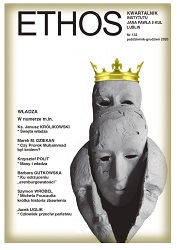Kultura filmowa w okupowanej Korei w latach 1910-1945
Film Culture in Korea under the Japanese Rule from 1910 to 1945
Author(s): Krzysztof LoskaSubject(s): Political history, Government/Political systems, Pre-WW I & WW I (1900 -1919), Interwar Period (1920 - 1939), WW II and following years (1940 - 1949), Film / Cinema / Cinematography, History of Art
Published by: Katolicki Uniwersytet Lubelski Jana Pawła II - Instytut Jana Pawła II, Wydział Filozofii
Keywords: colonialism; film culture; World War II; Korean cinema; Japanese occupation;
Summary/Abstract: Drawing on the idea that Japanese colonialism was by no means confined to military conquest, but involved an implementation of a specific cultural project aimed at the creation of a Pan-Asian political community, the author of the paper proceeds to show that cinematography was among the basic instruments propagating the new political order in East Asia. In his analysis of the Korean film culture of the period of the Japanese rule (1910–1945), the author brings out internal contradictions of the apparently homogenous cultural project implemented in Korea by Japan. The discrepancies in question were caused by factors other than the contents and the form of the movies, among them the film production and distribution systems (e.g., the cooperation between Japanese and Korean film studios), the organization of film shows, the opinions of film critics, the weight of the political element (e.g., the censorship and the cinematographic law), and the social impact. The object of the author’s scrutiny is documentaries as well as fi ction fi lms, in particular those promoting voluntary military service in the Imperial Japanese Army, which leave no doubt as to the propagandist nature of the film productions in question.
Journal: Ethos. Kwartalnik Instytutu Jana Pawła II KUL
- Issue Year: 33/2020
- Issue No: 4
- Page Range: 295-312
- Page Count: 18
- Language: Polish
- Content File-PDF

